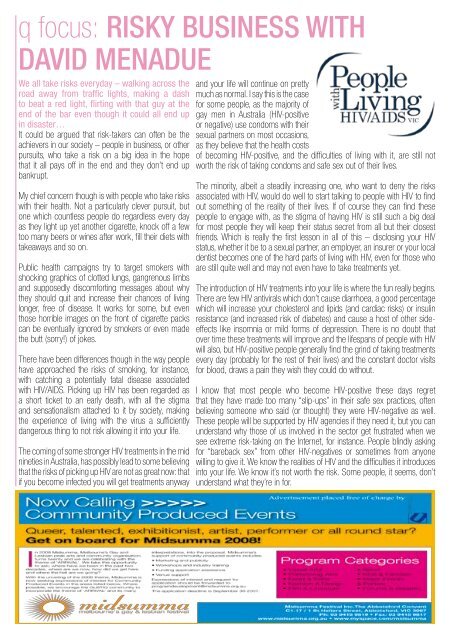Create successful ePaper yourself
Turn your PDF publications into a flip-book with our unique Google optimized e-Paper software.
q focus: RISKY BUSINESS WITH<br />
DAVID MENADUE<br />
We all take risks everyday – walking across the<br />
road away from traffic lights, making a dash<br />
to beat a red light, flirting with that guy at the<br />
end of the bar even though it could all end up<br />
in disaster…<br />
It could be argued that risk-takers can often be the<br />
achievers in our society – people in business, or other<br />
pursuits, who take a risk on a big idea in the hope<br />
that it all pays off in the end and they don’t end up<br />
bankrupt.<br />
My chief concern though is with people who take risks<br />
with their health. Not a particularly clever pursuit, but<br />
one which countless people do regardless every day<br />
as they light up yet another cigarette, knock off a few<br />
too many beers or wines after work, fill their diets with<br />
takeaways and so on.<br />
Public health campaigns try to target smokers with<br />
shocking graphics of clotted lungs, gangrenous limbs<br />
and supposedly discomforting messages about why<br />
they should quit and increase their chances of living<br />
longer, free of disease. It works for some, but even<br />
those horrible images on the front of cigarette packs<br />
can be eventually ignored by smokers or even made<br />
the butt (sorry!) of jokes.<br />
There have been differences though in the way people<br />
have approached the risks of smoking, for instance,<br />
with catching a potentially fatal disease associated<br />
with HIV/AIDS. Picking up HIV has been regarded as<br />
a short ticket to an early death, with all the stigma<br />
and sensationalism attached to it by society, making<br />
the experience of living with the virus a sufficiently<br />
dangerous thing to not risk allowing it into your life.<br />
The coming of some stronger HIV treatments in the mid<br />
nineties in Australia, has possibly lead to some believing<br />
that the risks of picking up HIV are not as great now: that<br />
if you become infected you will get treatments anyway<br />
and your life will continue on pretty<br />
much as normal. I say this is the case<br />
for some people, as the majority of<br />
gay men in Australia (HIV-positive<br />
or negative) use condoms with their<br />
sexual partners on most occasions,<br />
as they believe that the health costs<br />
of becoming HIV-positive, and the difficulties of living with it, are still not<br />
worth the risk of taking condoms and safe sex out of their lives.<br />
The minority, albeit a steadily increasing one, who want to deny the risks<br />
associated with HIV, would do well to start talking to people with HIV to find<br />
out something of the reality of their lives. If of course they can find these<br />
people to engage with, as the stigma of having HIV is still such a big deal<br />
for most people they will keep their status secret from all but their closest<br />
friends. Which is really the first lesson in all of this – disclosing your HIV<br />
status, whether it be to a sexual partner, an employer, an insurer or your local<br />
dentist becomes one of the hard parts of living with HIV, even for those who<br />
are still quite well and may not even have to take treatments yet.<br />
The introduction of HIV treatments into your life is where the fun really begins.<br />
There are few HIV antivirals which don’t cause diarrhoea, a good percentage<br />
which will increase your cholesterol and lipids (and cardiac risks) or insulin<br />
resistance (and increased risk of diabetes) and cause a host of other sideeffects<br />
like insomnia or mild forms of depression. There is no doubt that<br />
over time these treatments will improve and the lifespans of people with HIV<br />
will also, but HIV-positive people generally find the grind of taking treatments<br />
every day (probably for the rest of their lives) and the constant doctor visits<br />
for blood, draws a pain they wish they could do without.<br />
I know that most people who become HIV-positive these days regret<br />
that they have made too many “slip-ups” in their safe sex practices, often<br />
believing someone who said (or thought) they were HIV-negative as well.<br />
These people will be supported by HIV agencies if they need it, but you can<br />
understand why those of us involved in the sector get frustrated when we<br />
see extreme risk-taking on the Internet, for instance. People blindly asking<br />
for “bareback sex” from other HIV-negatives or sometimes from anyone<br />
willing to give it. We know the realities of HIV and the difficulties it introduces<br />
into your life. We know it’s not worth the risk. Some people, it seems, don’t<br />
understand what they’re in for.

















